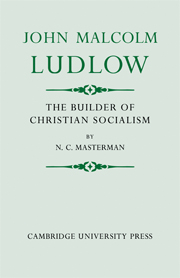Book contents
- Frontmatter
- Contents
- Acknowledgements
- INTRODUCTION
- I THE PARISIAN SCHOOLBOY
- II THE STRANGE YOUNG LAWYER
- III THE FRATERNAL CHRISTIAN
- IV FRENCH SOCIALISM FOR ENGLISH CHARTISTS
- V THE STATESMAN OF CO-OPERATION
- VI THE PRODUCER'S THEORETICIAN
- VII A PROPHET OUT-PROPHESIED?
- VIII REVIEWER AND EDUCATIONALIST
- IX THE DEMOCRATIC IMPERIALIST
- X THE MENTOR OF GERMANS
- XI LEGISLATOR AND CIVIL SERVANT
- XII THE CRITICAL UNIONIST
- Conclusion: LUDLOW'S ACHIEVEMENT
- Appendix: LUDLOW ON THE JUNTA
- Notes
- Bibliography
- Index
VII - A PROPHET OUT-PROPHESIED?
Published online by Cambridge University Press: 07 October 2011
- Frontmatter
- Contents
- Acknowledgements
- INTRODUCTION
- I THE PARISIAN SCHOOLBOY
- II THE STRANGE YOUNG LAWYER
- III THE FRATERNAL CHRISTIAN
- IV FRENCH SOCIALISM FOR ENGLISH CHARTISTS
- V THE STATESMAN OF CO-OPERATION
- VI THE PRODUCER'S THEORETICIAN
- VII A PROPHET OUT-PROPHESIED?
- VIII REVIEWER AND EDUCATIONALIST
- IX THE DEMOCRATIC IMPERIALIST
- X THE MENTOR OF GERMANS
- XI LEGISLATOR AND CIVIL SERVANT
- XII THE CRITICAL UNIONIST
- Conclusion: LUDLOW'S ACHIEVEMENT
- Appendix: LUDLOW ON THE JUNTA
- Notes
- Bibliography
- Index
Summary
During the final years of the existence of the Christian Socialist movement far-reaching plans were propounded by Ludlow which show that he, at any rate, had wished to carry on and had by no means come to terms with the mid-nineteenth-century conceptions of industrial life.
For he intervened once more and tried to reconstitute the Society for Promoting Working Men's Associations as a more effective instrument for his policies. Experience had made him sterner and more realistic, but more definite, too, in the expression of his faith. He wrote, during the summer of 1852, what he called his Thoughts on the reform of the society, which he intended to circularise to every member of the council. Maurice asked him not to do so, so that it had never been published before. Before he issued it, however, he was involved in another dispute with the Prophet, who had been away in Germany during the summer. This dispute revealed the basic differences in theological and political outlook which separated the older and the younger man.
The conflict began as a result of Maurice's action, when he returned from a visit to Germany during the summer of 1852. The Prophet did nothing about the problems connected with the workshops which worried Ludlow, but brought the series of tracts to an end: for he peremptorily forbade the publication of one by Lord Goderich (a Democrat, like Ludlow), who claimed that his family had been related to Oliver Cromwell and who liked working men to call him plain Jack Robinson.
- Type
- Chapter
- Information
- John Malcolm LudlowThe Builder of Christian Socialism, pp. 136 - 154Publisher: Cambridge University PressPrint publication year: 1963



